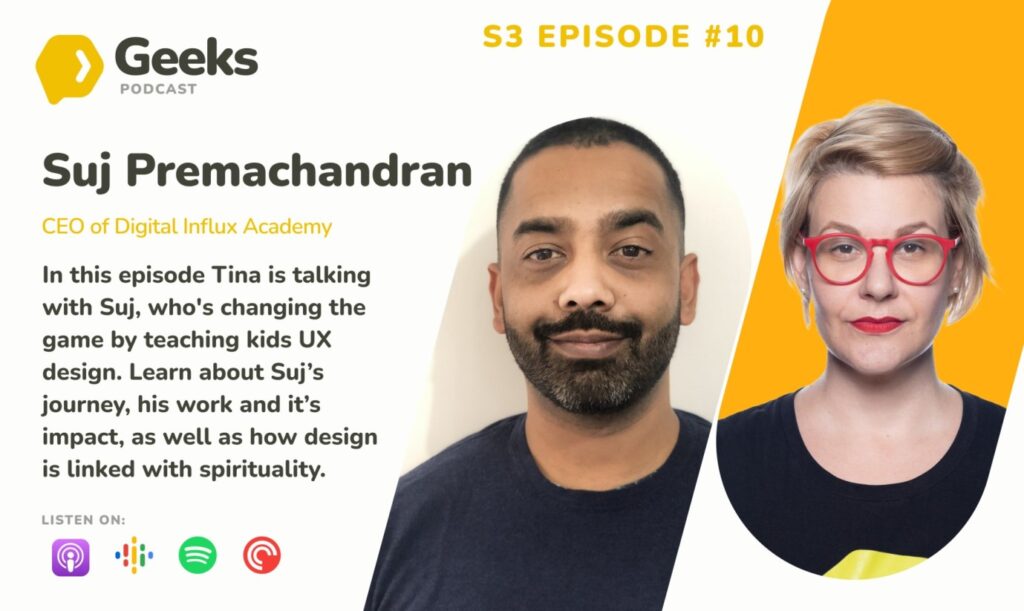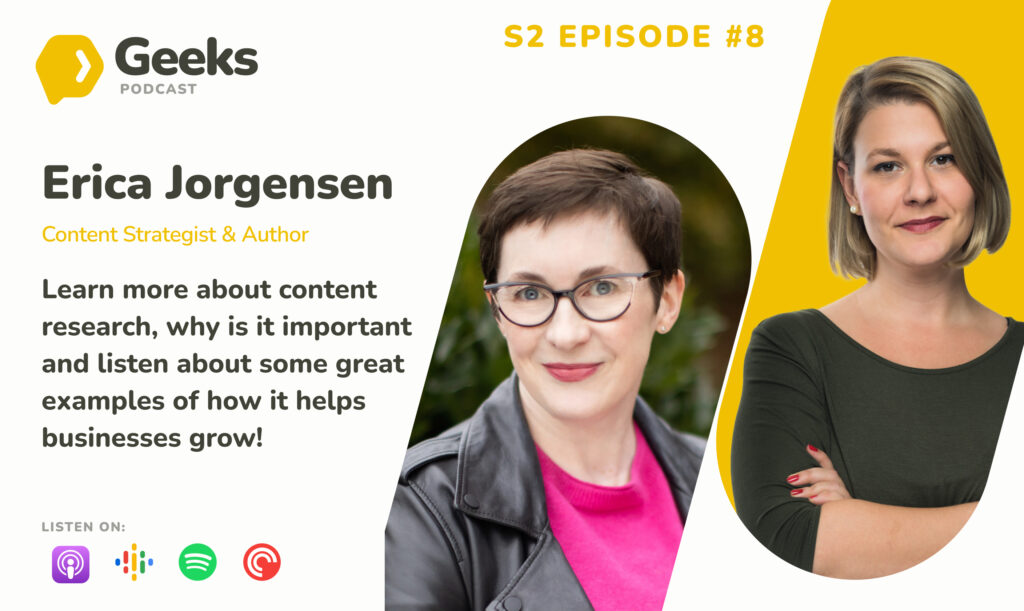In this episode, we explore the art of moderation within the context of the uxconVienna conference. The conversation delves into the complexities of diversity, inclusion, and cultural sensitivity in UX research, with a focus on the challenges faced by researchers when moderating discussions and panels. This episode showcases snippets of Tina’s and Mirjam’s talk, offering a thought-provoking exploration of the moderator’s role in fostering meaningful and respectful dialogues on pressing topics within the UX research field.
Episode highlights
00:02:29 – Diversity and Moderation
00:10:06 – Changing Moderator Hats
00:15:22 – Navigating Ethical Dilemmas
00:20:16 – Impact of Words
00:32:58 – The Role of a Moderator
00:34:58 – Closing Thoughts
About our guest Mirjam De Klepper
Mirjam De Klepper is a UX researcher and strategist specializing in digital health. With an impressive background in cultural anthropology and development sociology, she brings a multidisciplinary perspective to her work. Mirjam’s expertise extends from conducting interviews and usability tests to optimizing research processes. Her position as a Strategic Advisor at uxcon Vienna allows her to share her knowledge and ideas while addressing trending topics in the field. Connect with Mirjam on LinkedIn or visit her webpage to learn more about her valuable contributions to the UX community.
About uxcon Vienna
uxcon Vienna is a conference dedicated to UX Research and UX Design. It brings together professionals, experts, and enthusiasts in the field of UX to share knowledge, insights, and best practices. The conference is attended by both specialists from both Europe and the US, thus providing a great oppotunity for networking or professional exchange. Attendees can expect to learn about the latest trends and developments in UX research and design, gain practical skills, and connect with like-minded individuals. uxcon Vienna aims to inspire and empower UX professionals to create impactful user experiences.
Podcast transcript
[00:00:00] Tina Ličková:
Welcome to UX Research Geeks, where we geek out with researchers from all around the world on topics they are passionate about. I’m your host Tina Ličková, a researcher and a strategist, and this podcast is brought to you by UXtweak, an all-in-one UX research tool.
In this episode, I was talking to Miriam, who is a dear friend of mine, and she was also the moderator at the main stage of uxcon, that you might remember we were promoting and speaking to the speakers as well. This is a big experiment done right away after the conference. We were really tired and really exhausted from two days of moderation, but I really wanted to contemplate. The conference was for us, what is it for a researcher to act like moderator and maybe switch in between the roles.
And I think we also touched on very important things on how this job actually is political, as well as Miriam giving some beautiful examples on how to master moderating jobs. Tune in. Happy listening.
What are the first conclusions?
Conclusion is too soon for it, but I don’t know, maybe feelings.
[00:01:33] Mirjam De Klepper: The first word that comes to mind is: depleted.
[00:01:37] Tina Ličková: Hey, explicate, young lady.
[00:01:40] Mirjam De Klepper: No, I think it’s, I feel pretty good about it. I saw some stuff coming in on LinkedIn. But we always speak pretty hyperbolically on LinkedIn. I think it’s good to take it with a grain of salt, if people are like: Oh my God, this was the best thing ever. So amazing. Yeah, he said he had a good time. Okay, good. We all communicate in exaggerated terms on the internet, both negatively and positively. I do think it was a good event and I was quite pleased to see that one of the comments from one of our speakers who highlighted that, Hey, this wasn’t actually an event that paid attention to representation or like having a diverse set of speakers. Of course we can always do better, but I think we did an okay job on that. I’m proud of that, actually.
[00:02:29] Tina Ličková: I’m proud of that, especially coming from this area that we didn’t ignore the world because coming from this middle European area.
We could be like, that’s not our reality, but I think completely on, on the point. Yeah. We still need a job that could be better. This topic could be all the time better.
[00:02:51] Mirjam De Klepper: Yeah. No, because I was wondering about this because you just mentioned us here in Central Europe, And just defining how to call this part of Europe and how to call whatever lies eastward of Vienna is that there’s a lot of different complicated conversations about how to refer to that part of the European peninsula.
[00:03:19] Tina Ličková: This is where I’m realizing how I balance between the introversy and extroversy. At this conference I got to, because I told you I’m skeptical towards my ADHD diagnosis. But it’s something that I’m experiencing mostly in the crowd. Like I get so excited and I have to be everywhere and I can’t stick to a conversation longer than three minutes.
Then I have to change the conversation. Then I’m listening to other conversations. On the first day at nine o’clock in the morning, I was already ready. Okay, I had enough. Then I was like, no, you have to do the job. And then I’m just thinking about Andreas and Nicole, like, how can these guys even do the job?
Because I was just moderating and little stage managing the small stage, and it’s just, I am physically, mentally, emotionally exhausted in the best possible way. I don’t feel sad or anything, but it’s just, I didn’t feel so drained for a very long time.
[00:04:20] Mirjam De Klepper: But I think they’re doing okay. I’ve seen last year where it was a smaller event, but because it was smaller, of course, they also had to do even more themselves and now they had like really good support staff, I think, but of course they’re managing so many different things at the same time.
Like you said, we, for us, like we need to invest in the people- like the audience and the speakers and make sure that they feel welcome, I still need to find out if that worked out, but I hope they did. That’s where we invest our energy, but for them, they need to do so much more. They’re like the faces of it, at least for a way larger crowd than that we are. I was so impressed with, at the end of the day yesterday, how suddenly there was already a video recap. The event is like, how did you do that? Who did that? First of all, whoever did that, they did a fantastic job. But it’s like, how did they manage to oversee that? Then oversee everything that’s going on behind the scenes, manage and then, yeah, it’s just a lot. Also keeping in mind the online experience, I’m very curious how that is. And everybody texting them personally: Oh, this is happening. Yeah. Okay. Figure it out. Like for all kinds of logistical things. And it’s, yeah, it’s a lot. And I think by the end of it, it’s also really difficult to realize or to still have the brain capacity to think, okay, is this really relevant right now?
Because then at some point, maybe it’s when you’re exhausted, everything seems important and unmanageable. Everything is a big deal.
[00:05:54] Tina Ličková: Yeah, that’s a good point because the prioritization skill somehow falls apart when you are exhausted. You and everything seems to be super Complicated and super important at the same time, but I’m wondering because I want to maybe do this episode about self care for first, I don’t know, we can still get there, but maybe we won’t, but I want to ask you, like, how do you feel about the first question would be, how do you feel about your job, moderating job right now?
[00:06:29] Mirjam De Klepper: Like how I did the past two days or about that particular job in general? I find it hard to say. Last year. I felt good coming out of it. I knew I made a few mistakes. I felt good coming out of it. And then you get feedback and, Oh, maybe I didn’t do all that great after all. So I wanted to tread lightly, and not be like, Oh, I was amazing- to then hear from a gazillion people that actually I fucked up there and there and that really impacted me personally. So I’m a little bit wary of that. I do think I managed, I hope, to not insult anyone. And I was thinking about that this morning, because when you and I spoke the first time we were talking about, okay, what is the difference between interviewing as a professional interviewer for research reasons, the difference between moderating an event.
And doing like really small tidbits of an interview, maybe there, or like managing Q and A’s. Yesterday on stage we had a question on the screen. And I’m a person. I’m not like a neutral vessel.
So I read a question and I will probably have an opinion about it. I will have an interpretation of that particular question, which of course is always, you have the same when you have a live audience, but when you have a question on the screen without context, without knowing where that person might be coming from, you have to manage a lot of thought processes and then you need to somewhat in the moment decide which hat am I going to wear.
And if I’m wearing a researcher hat, I would take that question. Keep the words as they are and channel them through to the speaker at that point. As a, as an event moderator, I might take the liberty to rephrase the question a little bit, but of course that conflicts with my researcher mode, because as a researcher, I’m going to keep the language as is, because you don’t want to put words in the mouth or add interpretation.
And then as a moderator. I would still want to do right by the original question, but also by not making it difficult for the speaker, whereas if I would be a journalist or on TV or without being a journalist, I don’t know if that’s the thing, but if I would be interviewing for entertainment purposes. Then I would imagine that occasionally you would add extra fire to a question or extra you do that jump of interpretation if it could lead to a spicier story or a more interesting sound bite or a little bit of conflict, right? Because that’s fun to watch. It’s: bring out the popcorn and let’s have a go.
And I think as an event moderator, you have to be between the super neutral researcher position. And then of course, there’s the question, does that exist? But at least in the way that we ask questions and the journalist mode of. I don’t care if I insult someone, especially not so much my interviewee, if it makes for juicy television, making it very extreme. And yeah, that’s a delicate dance to do, I think. And ideally I want to incorporate all three. I want it to be interesting, but I also don’t want this, I don’t think it would get to that point.
If you don’t have full on conversations before with the speaker where you can say, okay, This is what we’re going for. What are you comfortable with? Should we deflect difficult questions or do you want to take them? What is your, because you don’t want a speaker to be like, Oh my God, I was put on the spot.
I am not the kind of person, maybe that speaker is not the kind of person who is good at coming up with answers off the bat that are understandable and cool. And I think this being the second time I’m doing uxcon, I’m still trying to figure out which hat I want to wear.
[00:10:06] Tina Ličková: How difficult is it for you to change those hats or to decide on one hat?
[00:10:11] Mirjam De Klepper: Sometimes it comes easily, but I would say there’s always a little bit of an internal monologue going on when you make snap judgments of, okay, what question, for example, if there’s no questions for the audience, I need to come up with a question, right? And this question needs to be interesting enough to capture the audience.
And at the same time, generous and kind to the speaker so that they have a moment to shine. And for me, I think when I’m switching those hats or when I’m having this internal monologue, if on top of that, I’m having another conversation with myself, all of this while being on stage of, okay, this is a complicated, tricky topic with a lot of societal debate going on around that.
And a lot of some discussions are minefield, right? Because there’s so many different components to it. And by the nature of the stage, you cannot go into every single nuance of the conversation in that particular moment. I’m aware of this, but I think my coping mechanism with this complexity is to talk more.
I get nervous. I know, okay, we’re touching upon complicated things. I know there’s a chance I’m not going to do it perfectly. And then I’m having this monologue in my head. How can I do justice to the theme? How can I make sure that I demonstrate that I’m not an idiot, but at the same time, keeping it easy enough for people to follow, but also not make mistakes.
And like this, just for me trying to explain this, I think it’s clear that it’s chaos and it doesn’t always work well, and then it just comes out. And then I am also always having this conversation with myself. Am I a political person or not? And I think for some people, I am not for others everything is political. And then there’s people who just- even with my very, I think, bare minimum of putting it, this conversation out there- who really flagrantly have already labeled me as a radical feminist fair, like a progressive person, not necessarily meaning that in a good way. An idealist, blah, blah, all those things, all of those conversations are happening in my head.
Also in the moment when we have a conversation about inclusion, about equity, about motherhood in the workplace. All of those topics that touch me personally, if then there’s a question on the screen and I need to interpret it with all these different layers and conversations going on in my head and somehow channel that into a meaningful yet entertaining conversation that doesn’t insult anyone.
That is really difficult. And then of course there’s the question, especially if we look at the more radical side of things. Maybe it should insult some people. Maybe it’s okay to take a stand, but then that’s the thing. At me as a moderator: am I supposed to take a stand or should I always be more neutral?
And then especially considering it’s a business event, which is in and of itself, I think a little bit of a conflict of interest sometimes.
[00:13:13] Tina Ličková: We can’t be in a way neutral about not being political because everything became political in the last years. I was just reading the book by Mike Montero, Ruined by Design.
Like how much we as designers and researchers are responsible for the state of the world right now with all the social media, staying as neutral, I get it in the moderation role, but also staying human and staying. I wouldn’t say I hate the expression, but moral authority, like you also have this kind of burden. I don’t know if that’s a good word.
But should you be the one thinking about the moral of things as well and keeping it in the room morally, right? not going into different directions where it could be and this is maybe tricky for us too because we both have big mouths reacting to situations where we get nervous with speaking more and making more stupid jokes.
[00:14:14] Mirjam De Klepper: Not helpful coping mechanism at all, I both know as well.
[00:14:18] Tina Ličková: So for example, I was explaining that I work for a client where they really sell cheap clothing. I said, Chinese socks. I was like, okay this is just bad. And it’s even more wrong because I was talking about sustainability, about the role of researchers being the moral force, talking to clients that they should be working on their sustainability and fairness and transparency and stuff like that.
So it’s also human making mistakes.
[00:14:51] Mirjam De Klepper: Absolutely. The thing is, if I look at where I see myself on a political spectrum, like I don’t really, I think ultimately I am firmly anti-capitalist and anti-growth or like degrowth. I don’t necessarily believe in work as something that is a must that people must do.
That’s my personality. And then I take that to a conference about business where people make products that they want to sell.
[00:15:19] Tina Ličková: How are you coping with that for yourself?
[00:15:22] Mirjam De Klepper: Oh yeah, it’s not easy. No, I’m not radical in my actions. I still live in this world and so far I did work in tech for a long time, so things that I really tried not to do when I was in my early twenties, like I was one of the last people in the West with financial capabilities who did not have a smartphone. And I have a complicated relationship to giving up data, but at the same time, I also really hate bad user experience. So where do we land then? There are a couple of companies that are actively boycotting. I am trying. And I think I’m doing an okay job. I don’t think I’ve bought new electronics in a very long time.
Pretty much everything is secondhand, including my laptop, which also just goes to show how easy it is to get a high quality laptop secondhand. And then they’re just being discarded.
[00:16:21] Tina Ličková: But you know what I also want to talk about because we too, I feel like it, we have something that I will, that I’m usually calling verbal or moral hangover. And we have a lot of guilt after moderation because it’s a hard job. And there are so many impulses that you have to digest. And you think, did I set this right?
Did I do this right? I personally had the hardest time in the second day in the first half where there were interactive sessions and the speakers needed me to be more in a facilitation role. Where I think it’s even there, it’s something divided. Moderation is inviting somebody, maybe asking a question, maybe entertaining people, bringing them up to speed, guiding.
Facilitation is like really navigating the process. And I really felt that jumping from one role to another, I didn’t feel cool about it. I felt like I’m using the strategy of being way too strict where people are like, Oh, she’s so much stressing with the time and then being nice with some jokes. I’m trying to tender it afterwards.
What is your guilt when you are moderating? What is left behind when you wake up in the morning and you’re like, Oh, maybe I did this wrong.
[00:17:42] Mirjam De Klepper: I think we touched upon it a little bit already. Yeah, I would be worried that I might have made somebody feel uncomfortable based on their systemic disadvantages that they experience in society.
So we’re talking about topics like ethnicity, which in the U.S. race would be the equivalent, I think in Europe, ethnicity is more, might be the equivalent of that or not the equivalent, but it’s a different reality. I think this is also a tricky thing because when you have an international conference, people bring their conversations from their lived spaces to a different space.
And I think the debates that are being had in the U.S. are sometimes conflated. Because the U.S. has such a strong voice and I sometimes think that those conversations are being inflated with conversations here in Europe. And I’m not saying that the ones in the U. S. are not valid or that there’s not.. Obviously there’s very strong ties between what happened with what our ancestors in Europe did and how that impacted the development of the U.S. in the EU or in Central Europe specifically. In this field, we’re also starting to have those conversations. Like what kind of situations exist in Europe where people might feel disenfranchised or where they’re not giving a chance and I’ve been speaking about this already in the past, first of all, being a woman, second of all, being in Europe from the other side of the previous iron curtain, which feels like such a dated thing to say the iron curtain.
But coming from Western Europe, that was all I was taught in school about this side of the world. The Habsburg empire didn’t mean anything to me. I barely knew where Vienna was until I moved here. Let alone know that there’s like a whole wealth of stories, history beyond that. What I was taught about the other side of the Iron Curtain was, Oh, it’s all dilapidated factories when Chernobyl happened at some point.
And I don’t really know where everything is. And then like in 2008 after high school, or a few years after high school, I went to Poland a few times. All regions have their own complexities and have certain figures and stereotypes and roles that impact people. And that we are very casual about if we’re not the one impacted by that joke or by that casual remark, be the Chinese socks.
Somebody is going to be impacted by those words. And for some, it’s easier to brush that off and say, Oh, that’s a joke or a figure of speech for others if this is actually impacting me.
[00:20:16] Tina Ličková: What I like about this discussion, and we have to have, especially as UX researchers, to have this discussion. For example, people were not happy about speaking to the microphone when we asked them, because on my stage we were making an audio recording.
And I asked multiple times and some people were rolling their eyes. And I know I used to hate it. But then I realized, my God, I am such dick because my brother is deaf. And I know people who have hearing disabilities who just don’t say it out loud and they’re sitting in the same room and they just don’t hear if you don’t have a microphone.
So I said it, the room became tense. And there is also one discussion that I had before with speakers and was on the first day where I was like, if I drop a politically incorrect joke, please don’t take it personally. I am just really bad at it. And one speaker, Javier, asked him, so this is, you are excusing yourself before, and he got a really good point, but I was like, no, I’m just telling you, giving you a heads up.
It might happen, but I will, of course, if I do something wrong, apologize after and suffer under it, and I’m going to be really careful about it, but it might happen and I’m sorry, sorry, sorry before, but this is the thing where I feel is the alibism or how do you call it in English? Where people say, Oh, I might be politically correct and they just do it because they apologize before.
No, you have to still keep watch and not try to be, dig towards people and try to be as much as correct. But literal things are, and I’m almost making fun of myself. That’s the thing. And when I’m making fun of myself as an Eastern European woman, for example, being angry all the time, 50 shades of anger or whatever.
And people take it literally and start to lecture me about how I shouldn’t talk about Eastern Europe. And that’s where I’m like, I don’t know, maybe I’m not good with my jokes, but this is also you explaining stuff about not making jokes about Eastern Europe and it’s probably not so good as well.
[00:22:16] Mirjam De Klepper: I heard some feedback about like throughout the conference from people and they’re like, Conference is too careful, people are not having the same rough conversations that might be happening on the other side of the ocean, in the US, in Canada, where people are having a lot more complicated debates.
But I think..
[00:22:38] Tina Ličková: But isn’t that a different political and social context of Europe that we are not so sensitive towards a few things and our reality is different.
[00:22:48] Mirjam De Klepper: So I think that is partially true. Of course the situation there is very different and I think it’s good to keep that in mind. I also think that in Europe we might be slightly less polarized and we do have more conversations.
It’s hard for me to tell because I’m a white woman from Western Europe. Even though my family was not originally from the Netherlands and we have our own complicated colonial history there, for me as a person and even as a woman, I don’t think I very often felt disenfranchised or not being taken seriously.
And that is a very luxurious position to be in. I might’ve been oblivious. So I would be really curious to hear what things are simmering under the surface in Vienna and in Central Europe in general, right? Because there is a lot of tension and there are a lot of different groups that live in a very small area that have very complicated historical relationships.
[00:23:52] Tina Ličková: Of course, just the thing is, if you look at, for example, the countries in the post communistic area, which there were a lot of people coming from Romania, Bulgaria, there were a lot of Slavic people, a lot of Czech people. We are just so busy with our own bad political situations that the diversity and inclusion talks are just way too far from us, but they are, and we just don’t see that they are way, they are very much a part of.
What we are going through, it’s just in a very different context. And I just, I was just sharing, for example, the post of a lady who is now moving from Slovakia because of the LGBTQIA plus situation. Last year, there were two people murdered. Our first terrorist attack was against LGBTQIA plus people. And now after a year feels that she doesn’t want to stay anymore.
And I get her. But my first thought was. How many people are going to say that she’s exaggerating it from Slovakia because we just don’t have it, we are very technologically forward. Way better than Austria and Germany and some Western countries where I think I was thinking at the conference Oh, the people from Romania and their banking, digital banks, and I don’t know, people from Ukraine with their digital citizen services, they must be laughing at some things that people are presenting from different Western countries, that we had at 10 years ago, but the thing is when they hear diversity and inclusion, we topics or equity or whatever, it might be like: Oh, that’s some completely somebody else’s problem. And that’s where we don’t connect on the international conferences, because I would say that block is socially not so progressive.
And that’s where I, this is what I was also taking into account. Like we have so many people with so many cultural backgrounds here, how do we bring it for context to everybody, which was, which is probably not even possible.
[00:25:58] Mirjam De Klepper: And you also see how people respond to what is being said on stage for something like, yeah, I’ve heard this a thousand times before, like, where’s the real action then for other people. Oh my God, this talk was so inspiring. I’m. Yep. On this. And this was an exit starting point for me. And that is regardless of where they are in their career or how old they are, or that just really depends on your social, cultural and economic background. I think. I was wondering though, I had the impression and I didn’t go over, obviously I didn’t see the participant list.
I just know of a few speakers and I am wondering, like: Where are all the speakers from Eastern Europe? Where are the Slovaks? Where are the Hungarians?
[00:26:44] Tina Ličková: It crossed my mind. And this is something I want to bring as a topic to Andreas and Nicole, because there are good people in that area, but I think you always need an advocate and you always need that connection.
But this is something that I would love to give some tips to people. But I’m also struggling in this podcast because as a podcaster, we have to have people who are well known, people who bring us listeners, and I’m trying to mix up with less known people. And just the tradition of, for example, just when you talk about UX research, it’s completely different in US and UK there, they work on different, with different methods, with different budgets, but the reality, and I hope to bring more Eastern Europeans and more people from around the world, because we, even with the attempt to bring speakers from Africa into my podcast, Africans told me it’s not really global.
And I get it, two speakers from Africa just don’t mean anything. And we are struggling because we don’t have the connection to, with Asian speakers, guests. So it’s also, yeah, if I should be the advocate, I’m taking the role, nudging it into the direction and staying with the thing in mind. It has to be, it just doesn’t have to be a diversity hire for a speaker, but it has to be a good person.
[00:28:15] Mirjam De Klepper: Yeah, I think that’s also a very interesting place where we find ourselves. In the UX field, working in tech, being from Europe, in our cases, I think there’s this tension, right? Because we work on an international level. But we are, I wrote my thesis about the relationship between the local and the global and our very physical spaces, the kind of meaning that we give to it and how we then map out those things to have artifacts that kind of bridge the physical space, what we are aware of in the physical space and what mental layers we have for that. There’s some very complicated French writing on that, that I obviously read in translation and probably didn’t fully get, but it’s complex how we shape the world and how we see that world.
So my point is that: in one way, who are we here? Like just two people in this very tiny piece of the world, thinking that we now need to enable global stages, make sure that we cover everyone all across the globe in this podcast that has a decent reach, but it’s not like a gazillion people are listening to it. Is it really up to us to make sure that all those voices are heard or is it also okay to just make a nice local podcast where we talk to people that we know that are in our network, that are in our local area as in physical space.
[00:29:43] Tina Ličková: Good question. But I also think you can just, especially in UX research, you can just say: it’s a typical X locally think globally. So I can act here, but I sit at least from time to time and have to get out of my bubble and check with the outer world and check for the people who are outside my bubble.
[00:30:04] Mirjam De Klepper: I think that’s a blessing in the course of our generation, right? Like the world got a lot smaller, which also means that we can engage with a lot more. The question is, should we, and the other question is, can we really just like how we are wired and especially when it comes to political topics or seeing what kind of What a shit show the world is on all sides and what is happening everywhere.
It’s also, we also reached a kind of a psychological barrier. There’s only so many people you can personally relate to. There’s only so many people you can commiserate with. And some people are really good at it. They can fight the good fight for every single person who is being locked away unfairly or for every single class struggle that is happening.
And I think that’s really impressive. And I wish I was that person. I wish I could do that. And when you talk about guilt, I think that is the eternal guilt that I feel. Maybe it’s also like me having some sort of grandiose idea that I can save the world. And then obviously I’m failing every single day.
I’m failing at solving the world’s problems, which nobody has asked me to do. But which I think is always lingering in the back of my head and obviously moderating a business conference, that’s not going to change the world. It’s not going to make a dent in the, yeah, like the planet that we live in.
But yeah, then at least when I do go on stage, I want to do right by the people that paid a lot of money to be with us and I want them to be able to take away something valuable, at least within the confines of a career, or ideally a little bit outside of that career, because as I mentioned yesterday on stage as well, if there’s one thing to take away from the layoffs is we are not our job titles and there’s more to life than work.
And I mean that in the most meaningful way possible, like it’s very quick. People say very quickly, Oh, there’s more to life than work.
[00:32:07] Tina Ličková: The other hand, I’m thinking about UX research being in that UX phase, shaping the world without work. And I am happy that we are starting the discussion or that the discussion is so intense right now on how to be inclusive, how to bring the diversity to be alive even more, how, what means diversity in the context.
And that’s where I’m thinking, yeah, this is what work probably should be. That it has context with the world and even the moderating job. And this is where I would even maybe conclude is a job with a big context, which I didn’t realize before.
[00:32:58] Mirjam De Klepper: I do have, I think I do have a desperate need for showing the world that when I’m on stage, I think one of my fears is. I think other people have the same fear and I think it’s good to talk about these things more. One of my fears is I’m so worried that people think I’m dumb. I don’t know why, because no one ever in my life said, Oh, you stupid, but I’m so worried.
And I think the thing is when you go into that moderator role or you make a few mistakes on stage because you’re flustered or something else is happening, or you’re surrounded by all these highly intelligent people that are doing these conversations and these talks. I’m also a researcher. I’m also a thinker.
I also have. Sometimes there are too many thoughts in my head and I want people to know that it’s probably my vanity because we have something to prove. I want to show that I can do something, but then all the things that I want to do, like I’m not actually doing, but at least I’m thinking about them and I want people to know that I think, therefore I am.
[00:33:55] Tina Ličková: I get it because sometimes I was like, even thinking of jumping into a speedo.
Have a guess and like having a discussion about it because I know that shit. I know about that shit. But then again, there was one woman when one of the speakers, when people were having discussion in smaller groups came to me and he was like, you are a researcher and he really wanted to find out what I’m doing and I wasn’t able.
To tell him more. I was just like, yeah, I do research. That was it. That was my answer. Like I do very interesting stuff, but I was just in the mood of I can’t right now. And this is where I love what my mom is always telling me. When I do a presentation or, and I’m preparing for it, or I go for a moderation, she says: you are serving people. You are important, but you are serving the other ones. You are serving the other ones to shine there. And the serving is meant with the best possible connotation of the world, because as a Eastern European, I am very, yeah, trying to use the word very consciously.
[00:34:58] Mirjam De Klepper: No, I get that. I think I went through that last year when there were people on stage and I went, I want to show that I’m smart.
Like also this year, Peter did this talk about design ops. Oh, I took that course. I brought this into my organization. I know how that works. I really want to tell everybody that I know this, but of course it’s not about me. Like you said, like we are there in a moderation role to show, to give other people a space to shine.
And if I then go on there and then be all smart ass and say Oh what did you think about that tiny detail in that course that I happen to know about? That’s not my role. That’s not what we’re supposed to do. We are there to make other people shine, to me, to serve and to get audiences hyped that something is going to happen or to maybe not get them hyped, but get them in a solemn thinking mode.
Okay. We’re going to talk about something serious now. Or you need to set the tone. And of course, something that goes wrong because we don’t always know exactly what’s going to be in a talk. Yeah. So you have to hope that you set the right mood. And I think as moderators, this is something we can really play with.
And this is something you can actively work on and learn like how to you. And I think I did this bit for you last time as well, that you can use your voice to really hype people up because we’re going to do something super fun right now. Or- you can take a quieter approach and say, we are really going to talk about something meaningful. Let’s all take a moment to value what we’re about to talk about.
[00:36:33] Tina Ličková: Thank you for listening to UX Research Geeks. If you like this episode, don’t forget to share it with your friends, leave a review on your favorite podcast platform and subscribe to Stay updated when a new episode comes out.
💡 This podcast was brought to you by UXtweak, an all-in-one UX research software.
















